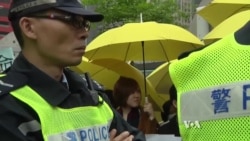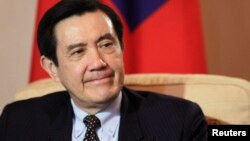As Taiwan's Beijing-friendly president resigns as head of his party, and protesters in Hong Kong talk about a longer-term struggle for democracy, Beijing has played it cool, downplaying the significance of the recent tensions and their possible long-term impact.
On Wednesday, Hong Kong's Occupy Central said 65 protesters, including the group‘s founders, turned themselves in to authorities. But after filling out forms, were released without charge.
Divided or united?
Protesters such as Priscilla Chiu decided to turn themselves into police to let authorities know how poorly they were handling the situation and to prevent any further violent clashes.
“I think like many, many citizens in Hong Kong, I am grossly disappointed because there has not been any change in the government stance towards this issue,” Chiu said.
And while not all agree, what is clear is that few feel the struggle will end any time soon.
Some student leaders who are refusing to leave have launched a hunger strike instead in a bid to restart talks with the government over how the city’s next leader should be elected.
China says only two to three candidates can run in the 2017 race and that they must be vetted first by a pro-Beijing committee. Protesters want direct elections and the right to select candidates without Beijing’s interference.
Long haul
Protesters who spoke with VOA said regardless of what happens next, the movement has only just begun.
Sam Hui has been with the protesters from the very start and said he knows that democracy takes time.
“I, as well as the other protesters, we will try our best. If we can’t fight in these few years, maybe a few 10 years (decades),” Hui said, adding he would keep fighting to see the truth even it meant passing the work on to his children and grandchildren in the future.
Helen, a student protester who is studying to become a teacher, said her participation in the protests has made her more mature. She said she cares more about society now.
“In the past I may just think that I will just teach what I…I have to teach in school,” she said. “But now I think that it’s very important to tell the student what is happening in our society and what is the correct value that they should have in dealing with this situation.”
Growing divide
And it is not just in Hong Kong where a rift is growing between the younger citizens and a determined China. Over the weekend, the party of Taiwan’s pro-China President Ma Ying-jeou suffered a stunning defeat in local elections. Analysts blamed the loss in part on the president’s increased economic engagement with China and the turnout of younger voters.
Ma stepped down from his party post on Wednesday, a little more than a year before Taiwan holds its next presidential election.
President Ma’s decision to step down, as well as the Occupy Central leaders handing themselves over to police, received ample coverage Wednesday in China’s state-run media. Little was said, however, about how China’s policies toward both might be playing a part.
China says the electoral defeat has little to do with cross-strait relations and urged Taiwan to consider the “tangible benefits” that ties have already brought.
Beijing is hoping that message wins the day when Taiwan’s voters next head to the polls for elections in 2016. But much may depend on what happens in Hong Kong in the meantime.






